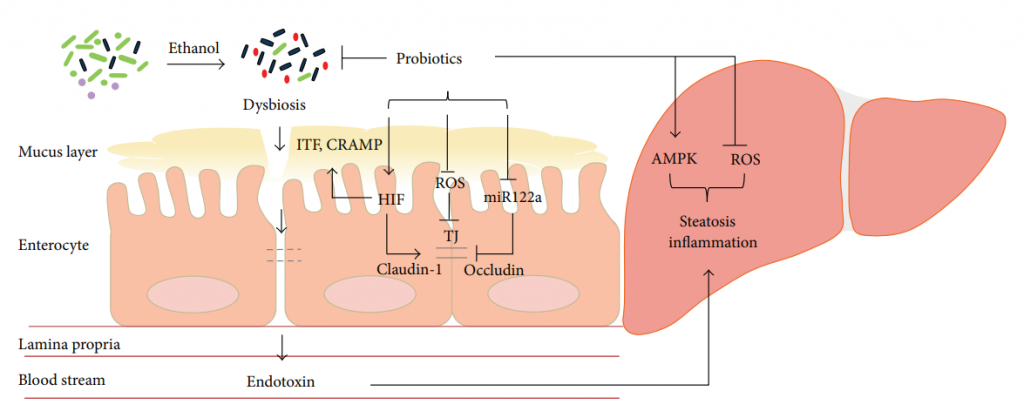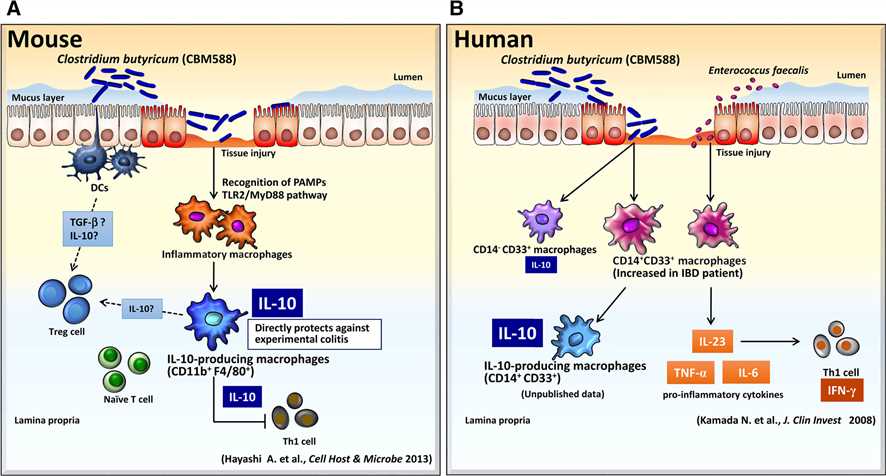Connie: Dear friends, it is great to have you here with us on this beautiful Saturday evening. Today, we are glad to invite Dr. Leonard Hofstadter, who has been an editor of scientific journals for a long time. Thank you for joining us tonight, Dr. Hofstadter.
Dr. Hofstadter: Thank you for inviting me, Connie. Good evening, everyone. I’m very excited to be here.
Connie: From our previous episodes, we have learned that the influence of intestinal microflora on host health is undeniable. Different types of microorganisms and strains have an impact on several axes of health. For example, probiotics affect the regulation of lipid metabolism and the process of cellular aging. What do these health aspects have in common?
Dr. Hofstadter: They all involve the activity of adenosine monophosphate-activated protein kinase. this enzyme can regulate energy balance and cell aging. In recent years, these aspects have triggered researchers’ interest, which has led to increasingly available information, including an overview of the molecular mechanisms that kinases may use to regulate lipid homeostasis and cellular senescence.
Connie: The interrelationship of different aspects of metabolism is complex, even difficult for people who study the phenomenon of metabolism to understand. As we said before, the intake of probiotics is beneficial. Can you remind us of the main benefits of ingesting or supplementing probiotics?
Dr. Hofstadter: Sure. The main benefits of ingesting or supplementing probiotics are the proper balance of gut microflora, regulation of microbial metabolism, and sufficient permeability and integrity of the intestinal membrane. It has also been reported that the consumption of some probiotic strains modulates anti-inflammatory signaling pathways and provides the gut microflora to increase the production of beneficial metabolites. A healthy microbiota helps to properly absorb the nutrients in food, such as vitamins and minerals, to maintain energy levels at an optimal level. Some probiotic strains produce vitamins B and K necessary for energy production at the cellular level.
Connie: Sounds amazing. And I have learned that Bifidobacterium and Lactobacillus probiotics can affect AMPK activity, but their molecular effects and complete molecular mechanisms are still unclear. So this leads to our today’s topic, I wanted to discuss the relationship between probiotics, AMPK, and metabolism. Where do we start, Dr. Hofstadter?
Dr. Hofstadter: As we have already mentioned, the intestinal microflora plays a vital role in maintaining health. Probiotics have an important influence on this process, and the dynamic balance of energy is the main issue. Energy metabolism includes the uptake, clearance, synthesis, hydrolysis, and secretion of lipids in the liver, skeletal muscle, and adipose tissue. AMPK activated by low-rate ATP or AMP mediates the energy state of the whole cell and its regulation.
Connie: In what ways does the AMPK complex play an important role?
Dr. Hofstadter: Due to its characteristics, the AMPK complex is important in the regulation of metabolism, cell growth, autophagy, and cell polarity. Previous studies have shown that the activation of the AMPK complex may be related to cell stress and can prevent cell aging and individual aging.
Connie: As far as I know, some preclinical models have shown that the effects of obesity and other factors on energy homeostasis may be weakened. What is the link between obesity and metabolism?
Dr. Hofstadter: Obesity leads to metabolic disorders in different ways, including hormone signals, such as leptin, hyperleptinemia, imbalance, and deficiency, which can further lead to elevated endotoxin levels and nonalcoholic fatty liver disease. These conditions establish a systemic inflammatory state. These facts provide a correlation for studying the relationship between damage and improvement of intestinal microflora, including the use of probiotics and energy balance.
Connie: What serious diseases can be caused by inflammation mediated by obesity?
Dr. Hofstadter: Excessive fat in the diet and long-term drinking may lead to intestinal and liver inflammation and imbalance of intestinal microflora, and you know, cause obesity, anxiety, impaired insulin sensitivity, impaired glucose metabolism, type 2 diabetes mellitus, anxiety, and colitis. So it’s generally concluded that impaired lipid metabolism is a condition factor for obesity, metabolic syndrome, and type 2 diabetes mellitus. All of these are mediated by the oxidative stress-related chronic inflammatory state. On the other hand, these harmful factors can also cause oxidative stress and may cause liver damage, immune, behavioral and endocrine changes, and cancer.
Connie: It seems that the obvious link between obesity, inflammation, and oxidative stress is fat. What implications does this have with AMPK related mechanisms?
Dr. Hofstadter: Hmm, let’s see. The mechanism of these phenomena is usually related to the disorder of lipid metabolism. This makes AMPK a promising therapeutic target for the treatment or prevention of these complications, because AMPK is adjusting from β Cell insulin secretion into the hypothalamus and it plays a crucial role in glucose and lipid metabolism at the systemic level.
Connie: And when we look at intestinal microflora, what is the effect of probiotics on AMPK activity? Can you give us some examples?
Dr. Hofstadter: Some probiotics may secrete compounds that increase or restore AMPK activity. For example, Clostridium butyricum is a normal population in the intestines of healthy mammals, and its strain MIYARI 588 is used as a probiotic because it can produce butyric acid. Butyric acid is a fatty acid that improves intestinal inflammatory disorders through an AMPK dependent mechanism. It improves lipid oxidation by controlling mitochondrial biogenesis and reduces adipogenesis by inhibiting the effects of transcription factors and reactive oxygen species. Another important probiotic type is Bifidobacterium. We have mentioned it quite a few times on this program. It is reported that some members of bifidobacteria contribute to reducing weight gain, inflammation, gastritis, pathogen proliferation, enhancing immune response, and other health effects.
Connie: Remind us the mechanism of action of Bifidobacterium and recent findings of it?
Dr. Hofstadter: Mechanism pathway of Bifidobacterium and tumor necrosis factor-α and nuclear factor- κB inactivation is related to inflammatory cytokines. Bifidobacterium can reduce endotoxin and alcoholic liver and intestinal injury caused by lipopolysaccharide. It has been reported recently that it can inhibit nuclear factor- κB. And lipopolysaccharide, tumor necrosis factor- α and the mechanism of activating sirtuin-1 can achieve these effects. All these effects are mediated by significant AMPK activation. The addition of milk fermented by different lactic acid bacteria in the diet can reduce the relative expression of lipogenic genes and regulate cholesterol transport and metabolism genes.
Connie: Do AMPK activation and nuclear factor- κB inhibition improve obesity-related diseases?
Dr. Hofstadter: Yes, with significant AMPK activation, Lactobacillus Plantarum has been shown to promote cholesterol absorption, improve glucose tolerance and insulin sensitivity, and reduce the accumulation of total triglycerides and lipids in different experimental models. In a more in-depth study, the activation of AMPK and the avoidance of nuclear factor- κB activation after a high-fat diet can improve obesity, hepatic steatosis and colitis caused by excessive fat intake.
Connie: As far as I know, there is increasing evidence supporting the effect of probiotics on intestinal inflammation and liver injury and AMPK plays a core role here. Do you know any results that support this finding?
Dr. Hofstadter: Yeah, let’s look at the anti-diabetic drug metformin and lovastatin, a cholesterol-lowering drug. Lovastatin is used as a contrast agent for pharmacological activation of AMPK. In the experimental model used, the overall effect of these drugs is to counteract the consequences of chronic alcohol exposure as a trigger for inflammation and endotoxin. Compared with the control drug, the effect of probiotic treatment is similar to metformin and lovastatin, and in some cases, the scope of action is wider. These effects were blunted by AMPK inhibitors and enhanced by AMPK agonists.
Connie: Interesting. We know that the importance of maintaining an adequate balance of intestinal microflora is guaranteed for the maintenance of overall health. And we also see increasing evidence suggesting that probiotic based treatments, mainly lactic acid bacteria strains, face the impact of factors that may disrupt this balance. And these microorganisms have AMPK related mechanisms. Has the activation of kinases by probiotics been widely studied?
Dr. Hofstadter: Just the opposite. In fact, there is little information about the chemical signals used by probiotics to activate kinases and their molecular targets or upstream effectors, except butyric acid from butyric bacteria. However, the regulatory pathways of probiotics in various intestinal and liver diseases have been reported in detail.
Connie: As mentioned earlier, another important activity of AMPK is to protect cells from certain factors such as aging caused by oxidative stress. Many factors such as reactive oxygen species, lipopolysaccharide and alcohol may trigger the reduction of AMPK signal. This may cause cell stress and lead to cell aging and individual aging. So do you think there is any way we can use the AMPK pathway to prevent aging?
Dr. Hofstadter: AMPK related metabolic pathways avoid aging and cell aging by maintaining the integrity of cell telomeres. Most of you probably are pretty familiar with telomere, but let’s briefly review it. Telomere bodies are located at both ends of DNA. As the number of cell divisions increases, it becomes shorter and shorter. Finally, when it becomes too short to divide, life dies. So being a special structural region, telomere plays an important role in the structure and stability of linear chromosomes. The function of telomere is to stabilize the chromosome end structure, prevent the end connection between chromosomes, and compensate for the vacancy caused by the elimination of RNA primers. It has been reported that telomere transcription may be regulated by transcription factor binding sites such as nuclear respiratory factor 1.
Connie: Is there a link between telomere transcription and AMPK dependent metabolism?
Dr. Hofstadter: Yes. AMPK dependent metabolism can be used as a compensatory mechanism to prevent the deterioration caused by telomere dysfunction.
Connie: So we can say that the relationship between general health and intestinal microflora balance is a recognized fact. However, in the past few years, emerging new evidence supports the relationship between intestinal microflora and specific aspects of health. Some reports have demonstrated the existence and function of the intestinal microflora brain communication axis. These communication channels have become the main source of scientific evidence for the effect of intestinal microflora on the control of energy homeostasis metabolism through the activation of AMPK.
Dr. Hofstadter: That is right. Although this research problem has the driving force of a new moon, the existing literature is still scarce. We know that most intestinal microflora AMPK effects affect lipid metabolism. In addition, other molecules involved in different metabolic processes, such as inflammation or response to stress, are regulated together with the activation of AMPK. This behavior doesn’t have a direct effect on AMPK, but is triggered by kinase induced lipopolysaccharide reduction. These findings suggest that more research is needed on all the molecular mechanisms of the effects of AMPK through intestinal microflora activation.
Connie: In today’s episode, Dr. Hofstadter outlined different energy related pathways, telomere structure and probiotic consumption. These pathways are mainly related to the prevention or improvement of the consequences of metabolic diseases. All these are linked by a regulatory enzyme acting on the immune system, energy balance, oxidative stress and cell life span. That’s it for our discussion today. Thanks Dr. Hofstadter for sharing your great insight. In the next few episodes, we will discuss the various roles of probiotics in maintaining and improving human health. Thanks everyone for listening. we will see you next time.
Dr. Hofstadter: Thanks, everyone. I hope we will see you next time.
